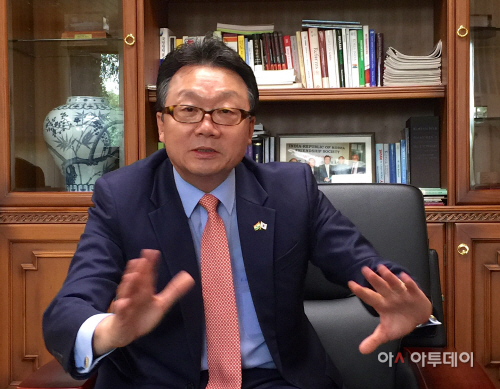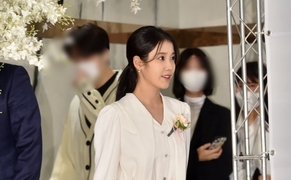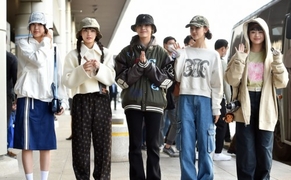By Ha Man-joo, India correspondent, AsiaToday - Lee Joon-gyu, South Korea ambassador to India, revealed on Wednesday that India PM Narendra Modi's leadership style is like former Korean President Park Chung-hee.
During an interview with AsiaToday at his office in New Delhi, Ambassador Lee said, "PM Modi and former President Park Chung-hee have things in common. They share similar leadership image. Both of them have a strong vision for the future of the country with plans, determination, and charisma to realize."
Lee said the Modi's administration is the first and the last chance for India's development, and India would have another chance for economic development if Korean companies contribute to the Indian economy.
He said, "How India sees Korea now is similar to how China saw Korea during Chinese's reform and opening up period. Korea has the experience and ability to meet the expectations of India."
He explained that the Modi government is the first and the last chance of the Indian modernization, and that Korea should invest in India, which emerged as a new blue ocean following China, to jump up to the next level as it achieved the 'Miracle on the Han River.'
The ambassador considers diplomacy as an idea that embraces the economic cooperation field aside from the traditional fields of diplomatic relations and security. One of his key schedules include visiting PM Modi and the central and local government officials along with Korean business leaders. He has met the then State Minister Modi when he made a visit to Gujarat with Korean business firms in October 2013. His last schedule as an ambassador in India is visiting Andhra Pradesh with an economic mission.
In the one hour-long interview, the main theme was naturally about economic cooperation between Korea and India.
 Lee Joon-gyu, Korean ambassador to India, stresses the importance of economic cooperation between Korea and India at the interview with AsiaToday on Wednesday at his New Delhi office./ Photographed by Ha Man-joo Lee Joon-gyu, Korean ambassador to India, stresses the importance of economic cooperation between Korea and India at the interview with AsiaToday on Wednesday at his New Delhi office./ Photographed by Ha Man-joo |
Q. You are currently in your third year as the ambassador in India. How has the relations between the two countries changed?
A. It has changed rapidly. The biggest change is that there has been a bigger opportunity to cooperate with Korea since the inauguration of the Modi government as it launched several active economic initiatives. Many different kinds of cooperation projects are being made in depth.
Q. What about changes in Indian society?
A. Since Modi took office, Indian society is experiencing a large-scale rapid change in a positive direction. Prime Minister Modi and the BJP government leaders are determined to make a better country through economic development. When I meet Indians, they say India is going to develop economically and everything is going to work well if they try hard along with Modi. This is such a tremendous change. It's the first one since my term of office, and perhaps the first one since the long history of India. Korea and other surrounding countries should cooperate with India and help the Modi government to successfully develop economically.
Q. What's India's attraction as land of opportunity?
A. Just like the phrase "Incredible India" adopted as a slogan by the Indian ministry, India is a country with wonders and endless possibilities. A company that comes to India with a long-term plan is likely to succeed. The most desired and viable sector is manufacturing. As you can see in the country's 'Make in India' initiative, India is well aware of the importance of manufacturing development, and sees Korea as one of the best partners. However,
Q. Modi visited Hyundai Heavy Industries (HHI) when he came to Korea.
A. Shipbuilding is one of the most desirable fields that the Indian government wants to cooperate. India's shipbuilding industry is weak due to several factors. India hopes to raise its competitiveness through cooperation with Korea. This is a new opportunity for Korea's shipbuilding industry as well. Our shipbuilding industries such as HHI are discussing ways to cooperate. The government plans to form a joint working group for cooperation soon.
Q. Aren't there opinion gaps within the Korean government on India?
A. It's true that the government, the people, and the media aren't putting as much attention to India's importance as they should be. India can be a new growth engine of the world economy, which is tottering by China shock. India can be our solid economic, political and diplomatic blue ocean.
 Lee Joon-gyu, Korean ambassador to India, stresses the importance of economic cooperation between Korea and India at the interview with AsiaToday on Wednesday at his New Delhi office./ Photographed by Ha Man-joo Lee Joon-gyu, Korean ambassador to India, stresses the importance of economic cooperation between Korea and India at the interview with AsiaToday on Wednesday at his New Delhi office./ Photographed by Ha Man-joo |
Q. How strong is the Korea-India relationship?
A. As President Park Geun-hye and PM Modi have met each other several times, I think the two became close personally and formed a confidential relationship. It's good foundation on which the two countries can strengthen cooperation. Modi had a deep understanding about Korea even before becoming prime minister. He has a firm idea that India should learn from Korea and cooperate for its economic development.
Lee made a visit to Gujarat in October 2013, and has discussed method of cooperation between Korea and India in cultural, educational, economic and industrial sectors with the then State Minister Modi.
Q. How can you describe Modi?
A. I met Modi several times. He and former President Park Chung-hee have things in common. They share similar leadership image. Both of them have a strong vision for the future of the country with plans, determination, and charisma to realize. So I'm personally expecting great things from him. I hope India can have a basis of rapid economic jump with Modi's leadership just like what we achieved in the past.
Q. India is actively attracting Korean firms at a central and state level by promising to set up Korean industrial zone. Isn't India overestimating Korean economy and firms' competitive power?
A. How India sees Korea now is similar to how China saw Korea during Chinese's reform and opening up period. Korea has the experience and ability to meet the expectations of India.
Q. How have the follow-up measures progressed since Modi's visit to Korea?
A. Korea and India formed a strategic partnership with former President Lee Myung-bak's India visit in 2010 as a momentum. Prime Minister Modi made a visit to Korea last May and held a summit talk with President Park Geun-hye, upgrading one step further the relationship between the two countries as special strategic partners. Korea plans to provide USD 10 billion to India for cooperation in infrastructure, comprising Economic Development Cooperation Fund of USD one billion and export credits of USD 9 billion for priority sectors. There are discussions between the governments and export-import banks about enforcement method. We expect a concrete plan will come out by the end of the year.
Most Read
-
1
-
2
-
3
-
4
-
5
-
6
-
7





















